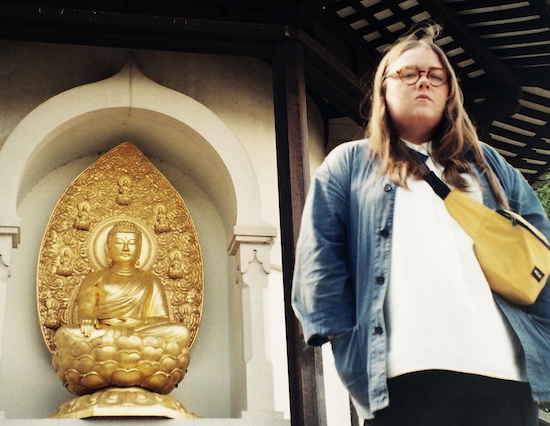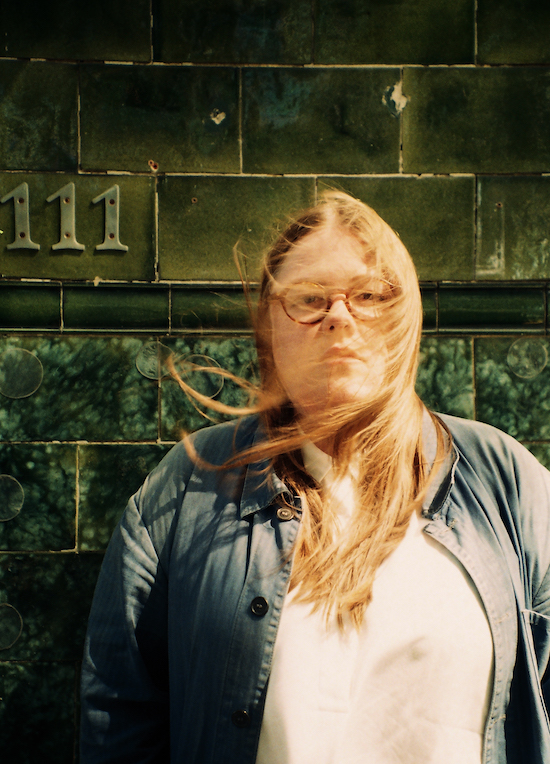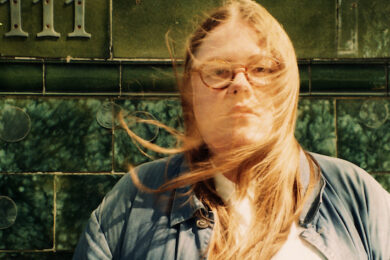Portraits by Matthew Benson
Emma-Jean Thackray’s singular brand of jazz is a heady and unique cocktail. Yorkshire-born, the musical polymath leads her band with virtuoso trumpet performances, mixing genres as though they’re fresh ingredients making up a potent solution.
Thackray’s own studies of jazz trumpet at the Royal Welsh College Of Music And Drama bring a tangible hard-bop element to them, whilst a love of Madlib and J Dilla colours her joyous approach to production. Thackray’s also spoken at meticulous length about her love of Tony Allen’s drumming, and brings a rich array of disparate influences to her own vivid output. With her Rain Dance EP earlier this year on her own Movementt imprint, Emma-Jean Thackray cemented her position as one of UK Jazz’s brightest rising stars.
However, as would be the case for the vast majority of jazz musicians hailing from God’s Own County, Emma-Jean Thackray’s musical beginnings are not as a jazz musician, but as a cornet player in a local brass band. Growing up between Wakefield and Leeds, Thackray spent her teenage years in various groups around the region. “Brass band is part of the Yorkshire DNA,” she tells me over the phone. “There was a local band in the village, and you’d go twice a week. It’s the main social event in the working week for some adults.” Indeed, oft overlooked as a musical influence, in large parts of the country, the brass bands of northern towns and villages (often connected with local collieries) are a key part of our engagement with music as a communal experience.
Thackray excelled in local bands: “By the time I was 13, I was principal cornet. I was with that band until I was 18." Indeed, whilst the music of brass bands is synonymous with colliery towns around Yorkshire, it’s a world away from the jazz alchemy that Thackray now concocts. “I was one of those annoying kids that were always doing something extra curricular. I was already trying to bring jazz into the mix, and I started playing trumpet when I was 14.”
Speaking to Thackray, what’s apparent is a total and immovable love of music. Even in her teens, she was playing with a different group every night and making her voice heard through the medium of a metal horn. “I was doing everything I humanly could with a trumpet. I was in school bands, the Yorkshire Wind Band, a symphony orchestra, a soul band with friends.”
Accomplished in all matters brass, Thackray left Yorkshire to study Jazz Trumpet in Cardiff. “Around that time, I was listening to a lot of jazz. Hard bop and bebop, alongside classical. I was just getting into Madlib and Jay Dee around that time too.” Whilst still playing in brass bands at uni (“Wales and Yorkshire have a shared brass DNA”), she was presented with an ultimatum by her teacher; to either specialise in jazz, or fully immerse herself in playing in brass bands. Thackray was a jazz specialist from that point on.
“Jazz is what spoke to me the most. Brass band music taught me so many things – how to play in an ensemble, how to make a good sound – but the music, I felt much more inspired by jazz. I knew that was my path.”

Playing in brass bands remains at Thackray’s roots, however, as she’s keen to acknowledge: “The biggest thing I took from brass bands was how to make a nice sound together, playing and really listening to the people around you. But nowadays I still love that sound; I tend to love layering the trumpet, the flugel and the trombone all together.”
Indeed, Thackray’s music is now pretty far from those community group performances; her recent music output sits at a spiritual crossroads between her brass band origins, and the sunnier world of Stones Throw hip hop and jazz experimentation. Her most recent release is a remix of ‘Open’, from the Rain Dance EP, which features Cali rapper Blu’s velvet cadence atop Thackray’s dense brass virtuosity. “There’s a lot of hip hop inspired by jazz, like Tribe,” she says: “but I think it also goes the other way.”
Testament to her expansive palate, Thackray’s music does have the thoughtful, ephemeral beauty that goes hand-in-hand with the image of a jazz musician channelling everything through a small horn, but every single song is also incessantly danceable; full of movement.
“Everything I release is based around the mantra ‘music to move the mind, move the body, move the soul’,” Thackray says, repeating the choral motif of her single ‘Movementt’ (her own imprint takes its name, and indeed ideology, from this). “I think my music has got this really grounding emphasis on groove, but whatever’s on top can be weird and difficult.”
Thackray is now based in South East London, after studying for a Masters with Issie Barratt at Trinity. She sees jazz as a highly malleable style of music that blends perfectly with so many other genres. This is a sentiment shared city-wide, she points out, quick to shout out her brilliant contemporaries. “One of the more tangible things I can see happening at the moment is jazz influenced by Afrobeat. Ezra Collective are huge now; Femi who leads them, has a Nigerian family, and he grew up listening to a lot of Afrobeat. That’s in him, and not only is it speaking to people in London that might have grown up listening to that music, now hearing it reimagined, but also people that just love groove and wholesome great music.”
London is currently a remarkable hotbed of talent at the moment. Whilst it’s superfluous to name every great musician, this year has already been graced by terrific albums from the likes of Moses Boyd and Shabaka And The Ancestors; it’s no wonder that Thackray has found a home for her singular brand of jazz. “Also, in London, I love that there’s also a huge producer culture as well,” she adds. “Being a jazz musician and a producer are entwined now. When I was a teenager I thought they were disparate things; but now I feel free to make jazz that’s influenced by house, or dub remixes of my jazz tunes.”
Thackray has found a creative home in London’s music scene, but also, perhaps more importantly, a consistent band perfectly suited to her style of composition. “When we play together, I tend not to be strict at all; I say, ‘I want this kind of a riff, or I want this kind of a groove, here’s the bones of it’ and I let it evolve into what it will eventually become."
The soloing of keys player Lyle Barton, Elliot Galvin on synths and Ben Kelly on the sousaphone provide thick brushstrokes of colour to Rain Dance’s grooves, while Dougal Taylor provides a propulsively rhythmical base. Despite having collaborated in the past with some real jazz behemoths, it’s with this band that Thackray is in her absolute element.
Thackray is putting the finishing touches to her debut LP this Summer, which she joyously announces will come out via Movementt. Although she’s released music already with the excellent US jazz label International Anthem (Irreversible Entanglements, Moor Mother) and has been featured on compilations by Soul Jazz and Acid Jazz, Thackray feels as though the freedom that comes with self-releasing is too great to miss out on.
“I felt like certain things I do wouldn’t fit on some labels. Bits would work here, and bits would work there, but I wanted a singular home where I’d just fit in. I don’t see all the elements of my music as being separate things. Whether it’s free jazz, or techno, this is me.”
In this year’s Rain Dance, and her recent singles, Emma-Jean Thackray is at the top of her game. The brass flourishes recall her days as principal cornet, whilst house keys, inventive drum fills and insatiable grooves capture an artist ready to experiment always. Whatever Thackray turns her hands to next, one thing can be sure; minds, bodies and souls will be moved.
Emma-Jean Thackray’s Um Yang is released later this month on Night Dreamer. She stands in for Mary Anne Hobbs on 6Music on Wednesday at midnight



